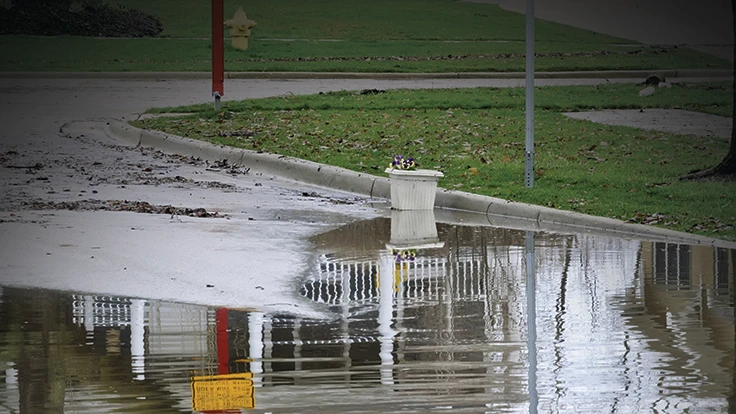
ALEXANDRIA, Va. – The preparations you make ahead of bad weather can help you have a safer clean-up when storms, hurricanes and floods hit. The Outdoor Power Equipment Institute (OPEI) reminds home and business owners that it’s best to get ready before a storm strikes.
“Preparing for bad weather is always wise, especially during summer storm season,” said Kris Kiser, president and CEO of OPEI. “While everyone thinks about buying milk, bread and toilet paper before a storm, many people forget about making sure their outdoor power equipment is in order. It’s important to keep your equipment in working order, have the right fuel for your generator or chain saw, and know where your safety gear is.”
OPEI offers the following tips to help homeowners and businesses plan ahead for storm clean-up:
Make a list of necessary items. Survey your property. Consider the damage a storm might cause and make a list of what tools might be needed for repairs. You might need a chainsaw, pruner, generator or utility type vehicle.
Take stock of your outdoor power equipment. Now is the time to check and make sure that your equipment is in good working order. Take your equipment to an authorized service center for maintenance or repair if needed.
Find your safety gear. Sturdy shoes, safety goggles, hard hats, reflective clothing and work gloves should all be located and stored in an accessible area with your equipment.
Review the owner’s manuals for your equipment. Read product manuals to ensure you know how to operate your equipment safely.
Have the right fuel on hand. Fuel stations may be closed after a storm, so it’s important to have the proper fuel for your equipment. Store your fuel in an approved container. Use the type of fuel recommended by your equipment manufacturer. It is illegal to use any fuel with more than 10 percent ethanol in outdoor power equipment (for more information on proper fueling for outdoor power equipment visit www.LookBeforeYouPump.com).
Be calm and use common sense when using outdoor power equipment. Circumstances during a clean-up are unusual. Clearheaded thinking and deliberate decision-making can help you make smart choices. This is no time to rush. Take time to think through a strategy.
Use safety precautions with chain saws. Be aware of fundamental dangers that can occur, such as chainsaw kickback, which may happen when the moving chain at the tip of the guide bar touches an object, or when the wood closes in and pinches the saw chain in the cut. Always stand with your weight on both feet, and adjust your stance so you are angled away from the saw chain blade. Hold the chainsaw with both hands. Never over-reach or cut anything above your shoulder height. Always have a planned retreat path if something falls. Read more about chainsaw safety.
Keep firm footing when using pole saws and pole pruners. Make sure you always keep a firm footing on the ground. Observe the safety zone, which means keeping bystanders and power lines (those above you and any that might have fallen down) at least 50 feet away from your work area.
Ensure portable electric generators have plenty of ventilation. Generators should never be used in an enclosed area or placed inside a home or garage, even if the windows or doors are open. Generators produce carbon monoxide, an odorless, colorless and poisonous gas that can be lethal. Place the generator outside and away from windows, doors, and vents that could allow carbon monoxide to come indoors. Keep the generator dry and do not use it in rainy or wet conditions. Before refueling, turn the generator off and let it cool down.
Sponsored Content
Lawn and Landscape Marketing on a Budget
Digital marketing can feel overwhelming when you’re working with a limited budget. Websites, SEO, social media, and paid ads can quickly add up, but you don’t need to do everything to see results. By focusing on cost-effective strategies, you can still make a big impact without overspending.
Drive Utility Type Vehicles (UTVs) with caution. Keep the vehicle stable, drive slowly and do not turn the vehicle mid-slope or while on a hill.
Be aware of others. Keep bystanders, children and animals out of your work area. Do not allow other people near outdoor power equipment, such as chainsaws, pole saws or pole pruners when starting the equipment or cutting with it.
Pay attention to your health. Storm cleanup can be taxing on the body and the spirit. Do not operate power equipment when you are tired or overly fatigued. Drink plenty of water and take regular breaks.
For more safety tips for outdoor power equipment visit http://opei.org/safety/
Get curated news on YOUR industry.
Enter your email to receive our newsletters.Loading...
Latest from Lawn & Landscape
- Landscape Workshop acquires EdgeForm Landscape Management
- Caterpillar's Umpleby transitions to executive chairman
- Sgro named Yanmar Compact Equipment's North American president
- APHIX acquires Curb Appeal Landscaping in Birmingham
- Project EverGreen helps revitalize Milan Park in Detroit
- Trex Company wins Product of the Year, Judges’ Choice Winner at Environment+Energy Leader Awards
- General Equipment & Supplies in Fargo adds Takeuchi equipment
- Mariani Premier Group acquires Hazeltine Nurseries








